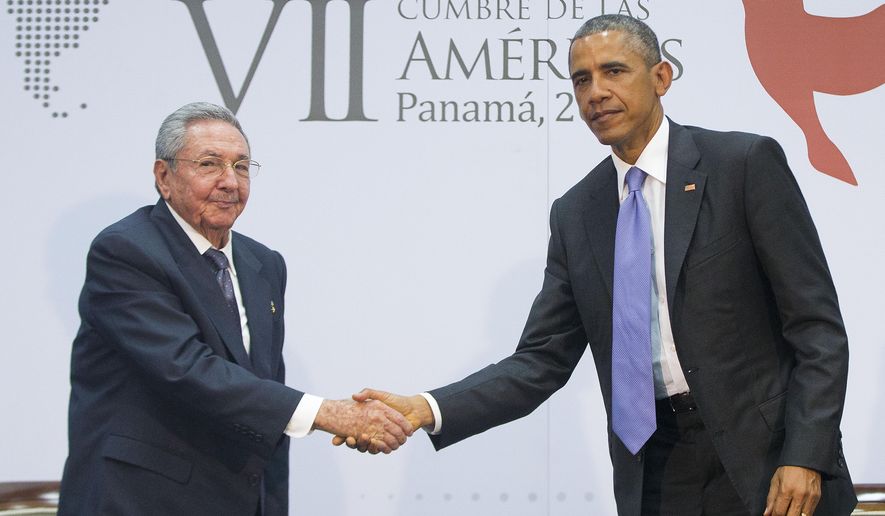The Obama administration on Friday officially scrubbed Cuba from the U.S. list of state sponsors of terrorism, removing a key barrier toward full normal diplomatic relations between the U.S. and the communist island.
While the move was weeks in the making — under U.S. law, the administration had to wait 45 days between announcing and formalizing the delisting — Friday’s development prompted harsh criticism from top Republicans and members of the Cuban-American delegation in Congress.
“The Obama administration has handed the Castro regime a significant political win in return for nothing,” said House Speaker John Boehner, Ohio Republican, who asserted that the “communist dictatorship” in Havana has failed to offer “any indication it will cease its support for violence throughout the region.”
Rep. Ileana Ros-Lehtinen, a Cuban-American and long an outspoken critic of the Castro government, went further, asserting that the administration had no real justification for removing Cuba from the state sponsors list, which now consists of just three nations: Iran, Sudan and Syria.
“Castro continues to provide a safe haven to terror groups like the Colombian FARC and Spanish ETA and harbors fugitives from American justice,” the Florida Republican said.
“President Obama’s decision to remove Cuba from the State Sponsor of Terrorism list demonstrates that this administration has once again put politics over policy,” Mrs. Ros-Lehtinen added. “Cuba should not have been removed … since one of the many reasons for its inclusion are its links to repressive regimes around the world such as Iran, Syria, and Russia.”
Former Florida Gov. and potential GOP presidential candidate Jeb Bush said the move is a sign that Mr. Obama is “more interested in capitulating to our adversaries than in confronting them.”
“Neither continued repression at home nor Cuba’s destabilizing activities abroad appear sufficient to stop President Obama from making further concessions to the Communist regime in Havana. … Iran’s leaders are surely taking note,” Mr. Bush said. “The removal of Cuba from the State Sponsors of Terrorism List and the unilateral concessions to Havana, before it changes its authoritarian ways and stops denying the Cuban people their basic human rights, is a mistake.”
Obama administration officials acknowledged that they still have deep concerns about human rights violations by the Castro government, but asserted that such concerns do not warrant keeping Cuba on the terror sponsor list.
State Department spokesman Jeff Rathke said administration officials making the delisting followed U.S. legal protocol, which included certifying that Cuba “has not provided any support for international terrorism” during the past six months. He added that Cuba “provided assurances that it will not support acts of international terrorism in the future.”
“The rescission of Cuba’s designation as a state sponsor of terrorism reflects our assessment that Cuba meets the statutory criteria for rescission,” Mr. Rathke said in a statement circulated to reporters. “While the United States has significant concerns and disagreements with a wide range of Cuba’s policies and actions, these fall outside the criteria relevant to the rescission of a state sponsor of terrorism designation.”
President Obama first announced his intent on making a historic change in U.S. policy toward to Cuba late last year. While criticism has been harsh, the president has also won support from major U.S. businesses eager for the U.S. embargo on trade with Cuba to be lifted.
The embargo was first imposed in 1960 roughly two years after Fidel Castro led a Marxist revolution that overthrew the Cuban government. U.S.-Cuban diplomatic ties were severed completely during subsequent years as tensions soared during the 1962 Cuban Missile Crisis.
While the Obama administration’s plan for lifting the embargo remains murky, some Democratic lawmakers have suggested that major developments could be coming soon.
On a visit to Havana this week, Sen. Tom Udall of New Mexico told reporters that there appears to be growing momentum to removing at least some elements of the embargo.
But the U.S. and Cuba have yet to open embassies in Havana and Washington.
Cuban President Raul Castro — Fidel’s brother — reportedly wanted his country to be removed from the terror list before moving forward and further normalizing relations.
Despite the lack of a U.S. embassy in Havana, there are reports that the number of U.S. citizens traveling to the island has skyrocketed during the months since President Obama first signaled his intention to reach a detente with Cuba.
The thaw in relations so far has led to a stunning 36 percent increase in visits by Americans to the island, including thousands who are flying into Cuba from third countries such as Mexico in order to sidestep U.S. restrictions on tourism.
From Jan. 1 to May 9, 51,458 Americans visited Cuba, compared to 37,459 over that period last year, according to new statistics provided exclusively to The Associated Press by Jose Luis Perello Cabrera, an economist in the University of Havana’s tourism studies department with access to official figures.
The figures also included revealing details on the thousands of Americans who are entering Cuba through third countries. There were 38,476 visitors who flew directly from the U.S. to Cuba, compared to 29,213 in the same period last year, AP reported. Another 12,982 Americans came in via third countries, a whopping 57 percent increase over the 8,246 Americans who flew to Cuba from elsewhere in the same period last year.
Mr. Perello told the news agency that Mexico, the Bahamas, Jamaica and the Cayman Islands are the top choices for Americans entering Cuba from non-U.S. points.
• Guy Taylor can be reached at gtaylor@washingtontimes.com.
• Ben Wolfgang can be reached at bwolfgang@washingtontimes.com.




Please read our comment policy before commenting.